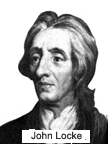|
|
|
||||||||||||||||||
|
|
|||||||||||||||||||
|
Homepage > Logic > Tests > Ordinary Language |
|||||||||||||||||||
|
|
|||||||||||||||||||
|
|
|
Introduction: John Locke (1632-1704) is best known in philosophy for his Essay Concerning Human Understanding. On the basis of that work, Locke is often described as the founder of modern epistemology. The purpose of Locke's Essay is "to inquire into the original, certainty, and extent of human knowledge, together with the degrees of belief, opinion, and assent." The following arguments (greatly altered) are suggested by Books, I, II, and IV of that work. Obviously, if a syllogism is invalid, one should not suppose that this is a mistake in Locke's Essay. Nevertheless, for the purposes of this test assume that Locke urges the following arguments. |
|||||||||||||||||
|
Send corrections or suggestions to webmaster@philosophy.lander.edu |
|||||||||||||||||||
|
Arguments | Language | Fallacies | Categorical Propositions | Syllogisms | Ordinary Language |
|||||||||||||||||||
|
|
. |
|
|||||||||||||||||

